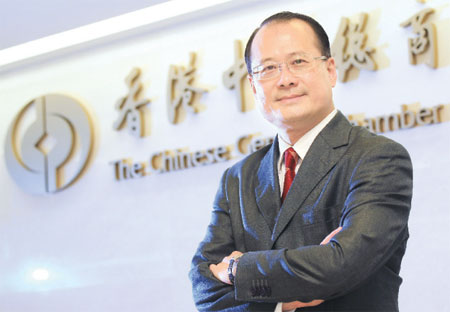Riding out the storm
Updated: 2011-09-16 07:56
(HK Edition)
|
|||||||
|
Jonathan Choi Koon-shum deems as indispensable the supportive policies of the central government, among which, he says, to position Hong Kong as an offshore renminbi hub is the most important one. Edmond Tang / China Daily |
Despite the gloomy world economic outlook, Hong Kong can stand up to the challenges ahead with new business opportunities abound, as a result of the solid backing of the central government, Jonathan Choi Koon-shum, chairman of the Chinese General Chamber of Commerce, tells Joseph Li in an exclusive interview.
Every cloud has a silver lining - and that applies to Hong Kong, in spite of the current global economic woes sparked by the US and European debt crises, prominent business leader Jonathan Choi Koon-shum believes.
The city's economy will remain stable as fresh business opportunities emerge from the strong backing of the central government through the 12th Five-Year Plan and the string of economic incentives brought here recently by Vice-Premier Li Keqiang, says Choi, who heads the Chinese General Chamber of Commerce.
In an exclusive interview with China Daily, he says the China factor will provide a solid backing, open the door to new opportunities and remove certain trade barriers although economic growth slowed slightly in the second quarter because of external economic upheavals following the downgrading of the US debt rating which has adversely affected the confidence and spending desire of American people.
"Since Americans have changed their consumption patterns and now spending less, the global consumption market, including the European market, has been affected. With both the US and EU markets cutting imports, China is receiving fewer orders which, in turn, has hit Hong Kong," Choi says.
The low US interest rates are worrying as the Quantitative Easing I & II exercises that "print bank notes" cause the greenback to slide persistently. Although the renminbi is strong, China cannot raise its interest rate because the US interest rate is already too low, causing inflation and forcing China to tighten money supply and leave interest rates unchanged, he observes.
"With the Hong Kong dollar pegged to the greenback, our currency becomes weak and we are, in effect, importing inflation into Hong Kong. As a result, prices of imported goods have gone up along with wages and property prices."
On a positive note, Hong Kong benefits from China's preferential economic and financial policies which are creating vast business opportunities to offset the external challenges, Choi says. For the first time, a dedicated chapter has been included in the 12th Five-Year Plan to support Hong Kong and help it flourish as an international financial, trade and shipping center.
During his recent visit to Hong Kong, Vice-Premier Li unveiled a package of 36 measures to prop up the city's economy.
"The most important among them is to position Hong Kong as an offshore renminbi center. The renminbi has grown increasingly important following setbacks in the performance of the US and European currencies. As the renminbi is still not fully circulated, it needs to go through another platform and Hong Kong is the perfect place to do that," Choi says.
Renminbi deposits in Hong Kong have increased substantially and rapidly. Initially, the volume was less than 50 billion yuan, but it had risen to nearly 500 billion yuan by mid-2011 and is expected to hit the 1,000 billion mark by year-end.
Choi describes the launch of the 20 billion yuan sovereign bonds in Hong Kong as a major step forward.
"Though the amount is not too big, it has a positive meaning especially when Vice-Premier Li said this will be a permanent mechanism."
In his view, Hong Kong should strive to become a major wealth asset management center of China.
"Hong Kong has such institutional strengths as diverse languages and a robust legal system to become a wealth management center in lieu of Switzerland now that its privacy law is no longer in place," he says.
The Closer Economic Partnership Arrangement - a sort of regional trade agreement across the border - will be boosted further as the forthcoming eighth supplementary agreement will definitely open up new avenues for Hong Kong businessmen and professionals, buoyed by Vice-Premier Li's pledge of trade liberalization between the mainland and Hong Kong in 2015 (the final year of the five-year plan).
To further strengthen Hong Kong's foreign trade, the Chinese General Chamber of Commerce is pressing for, through the central government, Hong Kong's admission to the Association of Southeast Asian Nations (ASEAN) as an independent customs territory. Hong Kong is a free port that levies no import tariffs, but many ASEAN countries do not provide reciprocal arrangements.
"This is unequal and disadvantageous to Hong Kong," Choi says. "ASEAN will not listen to us, but we stand a greater chance if the central government negotiates on our behalf. Given Hong Kong's close ties with ASEAN over the decades, it, if successful, will become a bridgehead of investment into China and this will benefit both the country and Hong Kong."
Choi revealed he had put forward the idea to Beijing on several occasions in various capacities. "I'm optimistic this will happen because their response of late is very positive."
(HK Edition 09/16/2011 page4)
